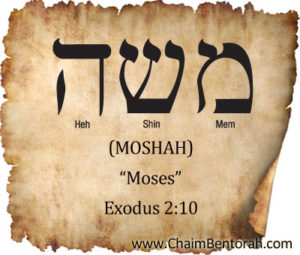HEBREW WORD STUDY – MOSES – MOSHAH משׁה
Exodus 2:10: “And the child grew, and she brought him unto Pharaoh’s daughter, and he became her son. And she called his name Moses: and she said, Because I drew him out of the water.”
 For such a great man as Moses having a name that means to draw out of water does not sound very promising. But the ancient rabbis and sages saw much more to the name Moses.
For such a great man as Moses having a name that means to draw out of water does not sound very promising. But the ancient rabbis and sages saw much more to the name Moses.
The first and most obvious is the definition of Moses, draw out of water. Pharaoh’s daughter indeed drew Moses out of water, the waters of the Nile. She drew him out of the one of the most significant gods of Egypt, Hepi a fertility god who was the god of the annual flooding of the Nile. The flood deposited fertile soil on the river banks. Why was Pharaoh’s daughter’s at the Nile? It says in Exodus 2:5 that she came to wash herself or to bathe. Bathe in the sacred waters, not likely, especially a daughter of Pharaoh who took luxurious baths in tubs filled with all sorts of fragrances like myrrh and frankincense. The word used in Hebrew here for washing or bathing is rachats which means to pour water upon yourself.
When the Nile overflowed it signaled the arrival of Hepi who was said to make women pregnant. She likely she went to Nile just at the point of overflow when Hepi was said to arrive. In fact the overflow of the Nile was said to be the arrival of Hepi. Women would anoint themselves with water from the Nile hoping Hepi would bring about a pregnancy. For the daughter of Pharaoh to happen upon a baby in a basket floating down the Nile it was like a gift from Hepi. Realizing it was a Hebrew baby she would face criticism so she named him Moses drew out of the waters (of the Nile) and hence a gift from Hepi. But Moses also means to separate. He was actually drawn away from the gods of Egypt, separated from them.
Now here is where the fun begins. Moses comes from the same root word as Messiah and indeed Moses was a picture of the Messiah and just as Moses would free his people from slavery in Egypt, the Messiah would come and free us from our sins.
If we take the name of Moses and turn that first letter Mem into a preposition “from” we have from shach. Shach means a little lamb. This shows the compassion of Moses the feelings and concern he had for others. Not to mention another Messianic picture.
Moses name predicts that he would have a long life. The numerical value of the name Moses is Mem = 40, Shin = 300 and Hei = 5 for a total of 345. Moses lived to be 120 years old. The Hebrew word for 120 beshagam which is spelled Beth = 2, Shin = 300, Gimmel = 3 and Mem = 40 for a total of 345.
If you spell the name of Moses backward it spells out the name Hashem which is a Jewish term for the Almighty, The Name.
The Jews call Moses, “Mosheh Rabeynu” “Moses our teacher.” As indicated above the numerical value of Moses is 345, the numerical value of teacher is Resh = 200, Beth = 2, Yod = 10, Nun = 50, Vav = 6 for a total of 268. 345+268 = 613. 613 is the number of commandments in the Torah. It was Moses who brought these commandments to His people.
Rabbi Samson Hirsch the nineteenth century linguist and Hebrew master pointed out that the word Moshah sounds like the word mosah which means to melt away, to vanish. Moses was probably the greatest man who ever lived, yet before the presence of God he just melted away and vanished as we, in our fancied greatness as teachers, pastors, church leaders need to mosah like Moshah vanish away in the presence of the Almighty God so people will only see God and not ourselves.







Recent Comments